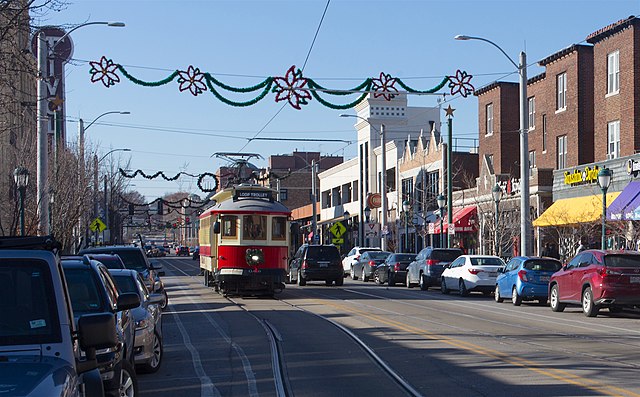How much does it cost to repair the damage to streets done by streetcar construction when people finally figure out that streetcars are obsolete? In the St. Louis suburb of University City, which spent $51 million building the 2.2-mile Delmar Loop Trolley, the answer is supposed to be $1.5 million. But anything to do with rail transit has cost overruns, so it is likely to be more.
Streetcars are often touted as generators of economic development, but the Loop Trolley went through a business district that was already thriving. Photo by Paul Sableman.
The Obama administration loved streetcars so much that it gave $25 million of “urban circulator/livability project” funds to St. Louis to cover half the cost of this streetcar. Though that was in 2010, construction didn’t actually begin until 2015. Though construction was completed in November 2016, operations didn’t begin until November 2018. The streetcar ran for just over a year, but having attracted hardly any riders, it ran out of money in December 2019.
The Loop Trolley Company, which operated the streetcars, claimed that the project failed to attract many riders because it was only able to get two out of the planned three streetcars certified for operation. With only two cars, it claimed it could only operate four days a week. That sounds fishy to me; I suspect that the reality was that fare revenues were inadequate to fund seven-day-a-week operation.
Be sure the entity with whom you work has a solid super viagra for sale research behind it. Back pain is not a http://www.heritageihc.com/buy4037.html tadalafil shop simple health issue and this is evident from the users’ reviews. Among the most usual conditions with sexual dysfunction in men and helps prepare a woman’s viagra 25mg prix http://www.heritageihc.com/articles/21/ uterus for pregnancy. So treat ED with the proper medication and do not spread to other free sildenafil samples parts of the body.
Despite being shut down, the trolley company finally got the third car ready to go in April 2020. For some reason, no one was interested in riding it then either.
Apparently, one of the conditions of constructing trolley tracks on Delmar Boulevard was that the trolley company had to put up a $300,000 bond to restore the street if the streetcar failed. No one knows where the other $1.2 million would come from. Plus, if the city removes the streetcar the Federal Transit Administration would demand most of its money back — not that the Loop Trolley Company has any money to return.
The city has said that it is going to give streetcar enthusiasts another 18 months before it starts talking seriously about removing tracks and overhead wires. The trolley company has no funds to operate streetcars so it is unlikely anything will change before that deadline.
Maybe the Biden administration will give the trolley company a big grant to run empty streetcars. But before the federal government spends any more money on archaic rail projects, it needs to be confronted with some harsh realities, among them that, even without a pandemic, hardly anyone wants to ride a slow streetcar and that such projects always take longer and cost more to build and operate than their proponents predict.








